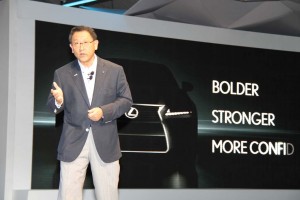Toyota Motor Co.’s comeback appears to have hit a couple of serious potholes with trouble in China and a huge and potentially expensive new recall.
In response to the new challenges, Standard & Poors has lowered its opinion of Toyota’s American Depository Shares to “Hold” from “Buy.” Those shares are used to permit the Japanese automotive giant to trade in the U.S., as well as Japan.
“Although we have not yet quantified the financial impact, we lower our opinion to reflect headline risk we see from increased headwinds in certain parts of its operations,” Efraim Levy, S&P’s senior equity analyst, said in a note to investors.
Toyota had been on a roll for most of 2011, the maker’s outpacing the recovery of the overall U.S. market and posting a 41.5% jump just last month. President Akio Toyoda accompanied strong earnings news released in August by forecasting Toyota with sold nearly 10 million vehicles worldwide this fiscal year, handily out-performing the previous 9.36 million record set in 2007.
But the Wednesday announcement that 7.5 million vehicles would be recalled – including 2.5 million in the U.S. – because of a potential fire risk brings comparisons to the unintended acceleration scandal that embroiled the maker in 2009 and 2010 and eventually led to the recall of 14 million vehicles.
Complicating matters, Toyota now plans to temporarily halve production in China, the world’s largest automotive market, due to ongoing protests and boycotts linked to Japan’s purchase of a chain of uninhabited islands in the South China Sea. The two nation’s angrily debate the ownership of what Chinese call the Daioyu Islands, Japanese the Senkaku.
What’s unclear is how much of an impact the latest recall will have on sales. Ironically, the maker announced the news the same day that Experian Automotive revealed that Toyota’s loyalty rate had rebounded sharply during the second quarter and now leads the industry. While most analysts expect loyalists to stick with the brand it is less clear if Toyota will lose so-called conquest business.
“TM’s preemptive recall (there have been no accidents or injuries reported) of 7.4 (million) vehicles globally takes some of the sheen off its recovering brand image and should have a financial impact, in our view,” wrote S&P analyst Levy. “Another concern is the possible impact of a territorial dispute between China and Japan that has already hurt Japanese auto sales in China. Still, TM’s U.S. sales continued their solid recovery in September.”
American Depository shares are U.S. dollar-denominated equity share of a foreign-based company available for purchase on an American stock exchange. American Depositary Shares are issued by depository banks in the U.S. under agreement with the issuing foreign company, according to Investopedia.
The problems in China could erode the company’s ability to challenge Volkswagen and General Motors , the dominant marques in that booming Asian nation. But it could also spoil Toyota’s bid to regain its position as the world’s largest automaker. It gave up that mantle in 2011 due to product shortages caused by Japan’2 March earthquake and tsunami.
Both GM and VW have strong operations in China and stand to gain from Toyotal’s woes in a number of key global markets.
Another unanswered question is whether other analysts will follow the influential S&P’s lead. At least from a financial impact, Deutsche Bank analysts won’t, writing that in terms of the actual cost of the latest Toyota recall, “We do not see this as having a meaningful impact on the shares.” The bank did not weigh in, however, on whether the hit to Toyota’s image might be more severe.
Paul A. Eisenstein contributed to this report.

